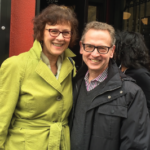“It’s lots of fun. I never imagined some of the things I’d be doing,” he says. Dr. Davis has also been able to keep his hand in the clinical and academic worlds. He still sees patients at UCSF, and he teaches small groups of medical students and rheumatology fellows.
Dr. Finck’s enthusiasm for the work she’s done in industry is palpable and contagious. After working for ALZA and Immunex as medical director and lead medical director, respectively, she joined Eos Biotechnology as vice president of clinical development. She served in the same capacity at PDL Biopharma and was senior vice president of research and development and chief medical officer at Osprey Pharmaceuticals before taking her current position as chief medical officer at NKT Therapeutics. The common denominator in all of these positions was the fact that they occupied the forefront of immunologic research. “Eos was one of the first companies to use the full genome to find targets for cancer biologics. That intrigued me, because I was not familiar with that area. We were able to make an antibody, do the toxicology work, file an IND [Investigational New Drug] application, and take it the clinic. This is the intellectual side of the job—the real interest of mine,” she says.
Another attraction for Dr. Finck is that her roles have changed over the course of her career in industry. “When I was working on Enbrel, I was the MD on the frontline. Now, as chief medical officer at NKT Therapeutics, I direct others to do the projects. I like the management role in leading-edge projects,” she says.
Dr. Finck explains that she works across a number of clinical areas in addition to rheumatology, including oncology, cardiovascular disease, pulmonary disease, and several others. NKT Therapeutics has developed antibodies to a unique subset of regulatory T cells—invariant NKT cells—that may have a role in exacerbations of asthma and chronic obstructive pulmonary disease and may play a role in autoimmunity and cancer.
“It keeps you learning,” she says. “I hadn’t done asthma in a long time, but I know how to get back to the books and the clinical literature to learn what’s changed,” an ability she credits to the “excellent training” she had at UCSF.
Does she have any regrets? Dr. Finck reports that she misses caring directly for patients. “But I live vicariously through the investigators I work with, who are academic rheumatologists. So, I don’t regret my move to industry at all,” she says.

